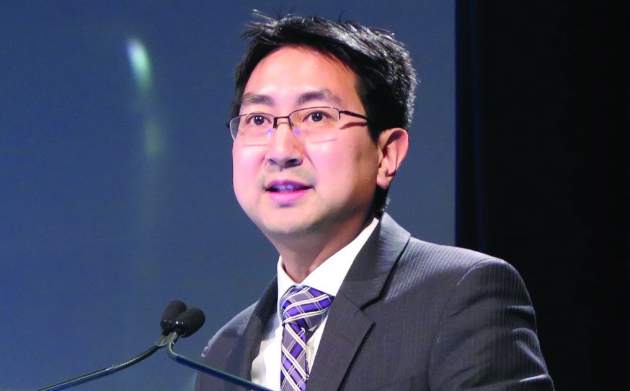REPORTING FROM THE 2018 GI CANCERS SYMPOSIUM
SAN FRANCISCO (FRONTLINE MEDICAL NEWS) – Adding ramucirumab to first-line chemotherapy for gastric and gastroesophageal junction cancer prolongs progression-free survival, but not by much, according to results of the phase 3 international RAINFALL trial.
A total of 645 patients were randomized to receive chemotherapy (cisplatin with capecitabine or 5FU) plus either placebo or ramucirumab (Cyramza), an antibody that targets human vascular endothelial growth factor receptor 2. The antiangiogenic antibody has been found to prolong overall survival in the second-line setting, as shown in the REGARD monotherapy and RAINBOW combination therapy trials.
Results of the new trial showed that, compared with placebo, ramucirumab yielded a significant one-quarter reduction in the risk of progression or death, investigators reported at the 2018 GI Cancers Symposium. However, the absolute gain was on the order of a week or so. Furthermore, there was no significant gain in overall survival.
“In patients with treatment-naive gastric and gastroesophageal junction adenocarcinoma, the addition of ramucirumab to first-line chemotherapy conferred a significant improvement in the primary endpoint of investigator-assessed progression-free survival, but did not confer any improvement in overall survival,” said lead investigator Charles S. Fuchs, MD, director of the Yale Cancer Center and physician-in-chief of the Smilow Cancer Hospital, New Haven, Connecticut. “Ramucirumab in combination with first-line chemotherapy did appear to be well tolerated.”
A session attendee asked, “Given the high cost and limited benefit in progression-free survival, what do you think of the statistical significance versus the clinical significance of the findings of this study?”
“We did have a statistically significant benefit in progression-free survival but did not see a survival benefit by any measure, so I wouldn’t purport that ramucirumab should be a first-line therapy,” Dr. Fuchs replied. “Should it supplant existing therapy in the first line? I don’t think the data support that.”
Clinical implications
“RAINFALL did meet its primary endpoint of progression-free survival. However, it was disappointing not to see some survival benefit,” commented invited discussant Stephen Leong, MD, of the University of Colorado Comprehensive Cancer Center, Denver. “Ramucirumab’s role in the first-line setting is debatable.”
The gain in median progression-free survival of 0.3 months, or 9 days, comes at an approximate drug cost of $67,112, he noted. And that does not include port or infusion costs.
Another consideration is whether ramucirumab should be continued beyond progression, as, for example, continuing bevacizumab in metastatic colorectal cancer does have an overall survival benefit. “However, I caution people about applying this to ramucirumab in gastric cancer,” Dr. Leong said, noting that data are limited because only about half of patients in RAINFALL received second-line therapy, and just a small share of that subset received ramucirumab.
The trial still leaves some important questions to be answered, he said. In particular, the secondary endpoint of quality of life and biomarker analyses have not yet been reported.
“Will ramucirumab get FDA approval for a first-line indication? No. The answer is quite simple. [The manufacturer] has already indicated that they are not going to pursue a first-line indication,” Dr. Leong said.
“Will this replace our current standard of care? Right now the standard of care is the doublet or triplet with a 5FU or platinum backbone. This is not going to replace that,” he said. Finally, “will the NCCN add ramucirumab to the first-line setting? This will be debated shortly.”
Study details
In RAINFALL, median investigator-assessed progression-free survival in the final intention-to-treat analysis was 5.85 months with ramucirumab and 5.55 months with placebo (hazard ratio, 0.75; P = .0024), Dr. Fuchs reported at the symposium, which is sponsored by the American Gastroenterological Association, the American Society for Clinical Oncology, the American Society for Radiation Oncology, and the Society of Surgical Oncology.
Median overall survival was 11.17 months with ramucirumab and 10.74 months with placebo, a nonsignificant difference. Findings for both endpoints were consistent across subgroups stratified by patient, disease, and treatment characteristics.
The overall response rate was 41% and 36%, respectively (P = .17), and the disease control rate was 82% and 77%, respectively (P = .10).
Treatment-emergent adverse events of grade 3 or worse were generally similar for the two groups, Dr. Fuchs reported. Patients in the ramucirumab group had higher rates of certain grade 3 or worse adverse events known to be related to the antibody’s mechanism of action (26% vs. 15%), such as hypertension (9.9% vs 1.5%) and gastrointestinal perforation (4.0% vs. 0.3%).
After the study, about half of patients in each group went on to receive additional (second-line) systemic therapy, mainly paclitaxel and (more) ramucirumab.
In an exploratory analysis, patients who received poststudy ramucirumab versus some other systemic therapy tended to have better overall survival, whether originally in the ramucirumab group (16.2 vs. 13.2 months) or the placebo group (14.9 vs. 13.0 months). Findings were similar when overall survival was assessed from initiation of the poststudy therapy.
Dr. Fuchs disclosed that he is a consultant to Agios, Bayer, Eli Lilly, Entrinsic Health, Five Prime Therapeutics, Genentech, Merck, Sanofi, and Taiho Pharmaceutical, and that he is on the board of directors of CytomX. The trial was sponsored by Eli Lilly.
SOURCE: Fuchs CS et al. GI CANCERS SYMPOSIUM Abstract 5




